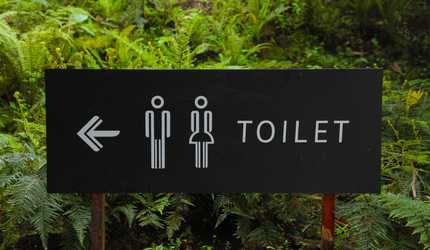How to Deal With Anxiety and Nervousness on Race Day

Contents
Dealing with anxiety and nervousness on race day can be a common challenge for beginner marathon runners. Olympic Marathon gold medallist Joan Benoit Samuelson actually coined this as a heavy dose of ‘PMS’ or ‘Pre-Marathon Syndrome’.
Another phrase commonly heard just before race day is ‘maranoia‘. The mental anxiety that something could go wrong before or during the marathon.
These feelings are normal and can actually be a sign that you are adequately prepared and ready to tackle the challenge ahead. However, it is important to manage these emotions in a healthy way so that they do not hinder your performance on race day.
Develop a Pre-Race Routine
One way to manage anxiety and nervousness on race day is to have a solid pre-race routine. This can include things like a proper warm-up, visualisation exercises, and positive self-talk. Having a routine can help to calm the mind and prepare the body for the race ahead.
Get Your Kit Together
The initial point of preparation on the eve of the event is to get your race gear ready to go. In the long build up to the event you will have perfected the combination of what you need to wear. The time for trying and testing new socks, shoes or shorts has passed.
Everything laid out in front of you works a treat. Do you need Vaseline or k-tape? Get it on the table!
Are you going to be taking any tech? A running watch? Get it charging and within sight of your kit.
Plan Your Food and Drink
Alongside preparing your run gear you will need to carefully consider what you want to eat in the build up to the event.
A common indulgence for new long distance runners is to overdo the carbohydrates the day before. The truth is you need to gradually increase your carb intake at least 5-days before the event, while reducing fats and fibres.
By eating more carbs you can store more energy in your muscles – pushing you on beyond the 2-hour running mark.
With this in mind, it is definitely worth planning your breakfast for the day of. This will remove any extra stress at the beginning of the day. You can just get up and eat. Are you taking any gels? Get them packed and ready.
Warm Up
This can include stretching, light jogging, and other exercises that help to get the body ready for the race.
A warm-up can help to improve flexibility, reduce muscle tension, and increase blood flow, all of which can help to reduce anxiety and nervousness on race day.
Visualise the Race
Another important part of a pre-race routine is visualisation exercises. These can include imagining yourself successfully completing the race; visualising your body moving smoothly and efficiently; and mentally rehearsing any challenges or obstacles you may encounter along the way. Visualisation exercises can help to calm the mind and reduce anxiety.
Tell Yourself You Have It!
Finally, positive self-talk can also be a valuable part of a pre-race routine. This can include affirmations, such as telling yourself that you are capable and ready for the race, or reminding yourself of past successes or achievements. Positive self-talk can help to boost confidence, reduce negative thoughts, and manage anxiety and nervousness on race day.
Consider What Is Causing These Feelings
It is very likely that you have had a few nights of bad sleep if you have never run a marathon before. Stress can cause the body to react in a number of different ways.
Try taking a moment and make a note (on paper or in your head) of the things that are causing you to feel this way. Are you worried about your fitness? Forgetting something on race day? An injury?
Simply taking the time to consider why you feel the way you do can do wonders for feeling stressed. And additionally by understanding what is making you feel anxious, you can see what is in your control, and what is not. Plan and prepare for what you are able too. And remember that nerves are natural.
Focus On The Present Moment
A great way to manage anxiety and nervousness on race day is to focus on the present moment. You can do this through doing deep breathing exercises.
Breathing Exercises
These can include taking slow, deep breaths, focusing on the sensation of the breath entering and leaving the body, and using the breath to calm the mind and reduce anxiety. Deep breathing exercises can help to relax the body, reduce muscle tension, and improve focus, all of which can help to manage anxiety and nervousness on race day.
Mindfulness
Mindfulness is also a good tool to use to help focus on the present moment. Zoning your attention into your surroundings; noticing the sights, sounds, and sensations that are present in the moment, and letting go of any judgments or distractions. Mindfulness can help to quiet the mind.
If you find yourself getting anxious during the race, it can be helpful to focus on your body and your breath as you run. Pay attention to how your body is moving, how your feet are hitting the ground; and how your breath is flowing in and out.
By focusing on these physical sensations, you can stay present in the moment and avoid getting caught up in anxious thoughts about the future.
It is normal to feel anxious and nervous on race day
It is important to remember that feeling anxious and nervous on race day is normal. It does not necessarily mean that you are not ready for the race.
In fact, these emotions can be a sign that you are taking the race seriously and are committed to giving it your best effort.
Reframe Your Thoughts
One way to manage these emotions is to reframe your thoughts about them. Instead of viewing anxiety and nervousness as a negative thing, try to view them as a sign of your preparation and readiness for the race. Remind yourself that these emotions are natural and that many other runners experience them as well.
Ultimately, you will feel discomfort and frustration, and you will suffer. The main task in endurance sports is to learn better to work with the discomfort.
Some sports psychologists call this ‘suffering better’. This requires you to push through what your mind establishes as the barriers to achieving. It takes a high level of awareness that can change your mind’s narrative in embracing (and conquering!) the challenge. There is an interesting article by Runners World about the science of suffering that may shed a little more light on this.
Focus on Your Goals
Another way to manage anxiety and nervousness on race day is to focus on your goals and reasons for running the marathon. Remind yourself of why you are doing this, and what you hope to achieve by completing the race. This can help to refocus your thoughts and boost your motivation.
Remind yourself that you have trained and prepared for this race, and that you are capable of completing it.
Think back to your training runs, and the progress you have made over the past few months. You’ve likely already clocked more than 40-miles a week in your training schedule!
If you are yet to start training, we have put together a comprehensive guide for beginners training for a marathon. Covering training schedule, goals – all the good stuff!
Seek support from others
Seeking support from friends, family, and other runners can be a valuable way to manage anxiety and nervousness on race day. Having a support system in place can provide encouragement, advice, and a sense of camaraderie.
One way to seek support is to surround yourself with positive and supportive people. This can include friends, family members, and other runners who can provide encouragement and motivation as you prepare for the race. They can offer words of encouragement, share their own experiences, and provide a sense of community and support.
More specifically, we recommend you work with a running check-in buddy in the build up to and on the day of the event. Use this person to offload any thoughts or worries early on the day of the race.
Joining a running group or club can also be a great way to seek support and build a sense of community and connection. Groups and clubs have experienced runners, who can provide advice and guidance on how to prepare for and succeed in a marathon. In particular runners can offer tips on training, nutrition, and race strategy.
Dealing with anxiety and nervousness on race day is a challenge that many beginner marathon runners face. However, by following these simple tips and strategies, you can manage these emotions in a healthy way. And in turn perform your best on race day!
This Is Common
Remember, you are not alone! Almost everyone gets pre-race anxiety. Running is a mental battle as much as it is physical.
Use the techniques above to handle what you can. And remember to enjoy yourself!


